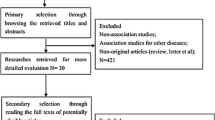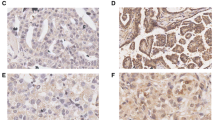Abstract
The presence of cancer stem-like cells (CSCs) has been demonstrated to be associated with tumor metastasis, chemoresistance, and rapid recurrence of various tumors. The impact of CSC-related markers in the metastasis and prognosis of ovarian cancer has not been well established. In this study, the protein expression of musashi-1 and ALDH1 was measured using immunohistochemistry. Results demonstrated that the percentage of positive musashi-1 and ALDH1 expression were significantly higher in ovarian serous adenocarcinomas, mucinous adenocarcinomas and clear cell adenocarcinomas than in cystadenomas and normal tissues. The percentage of positive musashi-1 and ALDH1 expression were significantly lower in patients identified with clinical stage I or II ovarian adenocarcinomas without lymph node metastasis compared to patients with clinical stage III or IV tumors and lymph node metastasis. The expression of musashi-1 and ALDH1 was found to be highly consistent in ovarian adenocarcinomas. Univariate Kaplan-Meier analysis showed a negative correlation between musashi-1 or ALDH1 expression and overall survival. Multivariate Cox regression analysis showed that positive expression of musashi-1 or ALDH1 in ovarian adenocarcinoma was an independent predictor of poor prognosis. Our study suggested that musashi-1 and ALDH1 expression are closely related to metastasis of ovarian adenocarcinoma. The positive expression of musashi-1 and ALDH1 might be a poor-prognostic factor of ovarian adenocarcinoma.



Similar content being viewed by others
References
Van Simaeys D, López-Colón D, Sefah K, Sutphen R, Jimenez E, Tan W (2010) Study of the molecular recognition of aptamers selected through ovarian cancer cell-SELEX. PLoS One 5:e13770
Hartge P (2010) Designing early detection programs for ovarian cancer. J Natl Cancer Inst 102:3–4
Willmott LJ, Fruehauf JP (2010) Targeted therapy in ovarian cancer. J Oncol 2010:740472
Hassan MK, Watari H, Christenson L, Bettuzzi S, Sakuragi N (2011) Intracellular clusterin negatively regulates ovarian chemoresistance: compromised expression sensitizes ovarian cancer cells to paclitaxel. Tumour Biol 32:1031–1047
Reya T, Morrison SJ, Clarke MF, Weissman IL (2001) Stem cells, cancer, and cancer stem cells. Nature 414:105–111
Yen TH, Wright NA (2006) The gastrointestinal tract stem cell niche. Stem Cell Rev 2:203–212
Dave B, Chang J (2009) Treatment resistance in stem cells and breast cancer. J Mammary Gland Biol Neoplasia 14:79–82
Douville J, Beaulieu R, Balicki D (2009) ALDH1 as a functional marker of cancer stem and progenitor cells. Stem Cells Dev 18:17–25
Benson DM Jr, Panzner K, Hamadani M, Hofmeister CC, Bakan CE, Smith MK, Elder P, Krugh D, O’Donnell L, Devine SM (2010) Effects of induction with novel agents versus conventional chemotherapy on mobilization and autologous stem cell transplant outcomes in multiple myeloma. Leuk Lymphoma 51:243–251
Riveros-Rosas H, Julian-Sanchez A, Pina E (1997) Enzymology of ethanol and acetaldehyde metabolism in mammals. Arch Med Res 28:453–471
Ma I, Allan AL (2011) The role of human aldehyde dehydrogenase in normal and cancer stem cells. Stem Cell Rev 7:292–306
Sladek NE, Kollander R, Sreerama L, Kiang DT (2002) Cellular levels of aldehyde dehydrogenases (ALDH1A1 and ALDH3A1) as predictors of therapeutic responses to cyclophosphamide-based chemotherapy of breast cancer: a retrospective study, rational individualization of oxazaphosphorine-based cancer chemotherapeutic regimens. Cancer Chemoth Pharm 49:309–321
Tanei T, Morimoto K, Shimazu K, Kim SJ, Tanji Y, Taguchi T, Tamaki Y, Noguchi S (2009) Association of breast cancer stem cells identified by aldehyde dehydrogenase 1 expression with resistance to sequential Paclitaxel and epirubicin-based chemotherapy for breast cancers. Clin Cancer Res 15:4234–4241
Alison MR, Guppy NJ, Lim SM, Nicholson LJ (2010) Finding cancer stem cells: are aldehyde dehydrogenases fit for purpose. J Pathol 222:335–354
Charafe-Jauffret E, Ginestier C, Iovino F, Tarpin C, Diebel M, Esterni B, Houvenaeghel G, Extra JM, Bertucci F, Jacquemier J, Xerri L, Dontu G, Stassi G, Xiao Y, Barsky SH, Birnbaum D, Viens P, Wicha MS (2010) Aldehyde dehydrogenase 1-positive cancer stem cells mediate metastasis and poor clinical outcome in inflammatory breast cancer. Clin Cancer Res 16:45–55
Chang B, Liu G, Xue F, Rosen DG, Xiao L, Wang X, Liu J (2009) ALDH1 expression correlates with favorable prognosis in ovarian cancers. Mod Pathol 22:817–823
Hemmati HD, Nakano I, Lazareff JA, Masterman-Smith M, Geschwind DH, Bronner-Fraser M, Kornblum HI (2003) Cancerous stem cells can arise from pediatric brain tumors. Proc Natl Acad Sci U S A 100:15178–15183
Okabe M, Imai T, Kurusu M, Hiromi Y, Okano H (2001) Translational repression determines a neuronal potential in Drosophila asymmetric cell division. Nature 411:94–98
Potten CS, Booth C, Tudor GL, Booth D, Brady G, Hurley P, Ashton G, Clarke R, Sakakibara S, Okano H (2003) Identification of a putative intestinal stem cell and early lineage marker; musashi-1. Differentiation 71:28–41
Nishimura S, Wakabayashi N, Toyoda K, Kashima K, Mitsufuji S (2003) Expression of musashi-1 in human normal colon crypt cells: a possible stem cell marker of human colon epithelium. Dig Dis Sci 48:1523–1529
Götte M, Greve B, Kelsch R, Müller-Uthoff H, Weiss K, Kharabi Masouleh B, Sibrowski W, Kiesel L, Buchweitz O (2011) The adult stem cell marker musashi-1 modulates endometrial carcinoma cell cycle progression and apoptosis via notch-1 and p21(WAF1/CIP1). Int J Cancer 129:2042–2049
Okano H, Imai T, Okabe M (2002) Musashi: a translational regulator of cell fate. J Cell Sci 115:1355–1359
Jiang F, Qiu Q, Khanna A, Todd NW, Deepak J, Xing L, Wang H, Liu Z, Su Y, Stass SA, Katz RL (2009) Aldehyde dehydrogenase 1 is a tumor stem cell-associated marker in lung cancer. Mol Cancer Res 7:330–338
Penumatsa K, Edassery SL, Barua A, Bradaric MJ, Luborsky JL (2010) Differential expression of aldehyde dehydrogenase 1a1 (ALDH1) in normal ovary and serous ovarian tumors. J Ovarian Res 3:28
Wang YC, Yo YT, Lee HY, Liao YP, Chao TK, Su PH, Lai HC (2012) ALDH1-bright epithelial ovarian cancer cells are associated with CD44 expression, drug resistance, and poor clinical outcome. Am J Pathol 180:1159–1169
Deng S, Yang X, Lassus H, Liang S, Kaur S, Ye Q, Li C, Wang LP, Roby KF, Orsulic S, Connolly DC, Zhang Y, Montone K, Bützow R, Coukos G, Zhang L (2010) Distinct expression levels and patterns of stem cell marker, aldehyde dehydrogenase isoform 1 (ALDH1), in human epithelial cancers. PLoS One 5:e10277
Kuroda T, Hirohashi Y, Torigoe T, Yasuda K, Takahashi A, Asanuma H, Morita R, Mariya T, Asano T, Mizuuchi M, Saito T, Sato N (2013) ALDH1-high ovarian cancer stem-like cells can be isolated from serous and clear cell adenocarcinoma cells, and ALDH1 high expression is associated with poor prognosis. PLoS One 8:e65158
Rahadiani N, Ikeda J, Mamat S, Matsuzaki S, Ueda Y, Umehara R, Tian T, Wang Y, Enomoto T, Kimura T, Aozasa K, Morii E (2011) Expression of aldehyde dehydrogenase 1 (ALDH1) in endometrioid adenocarcinoma and its clinical implications. Cancer Sci 102:903–908
Todaro M, Francipane MG, Medema JP, Stassi G (2010) Colon cancer stem cells: promise of targeted therapy. Gastroenterology 138:2151–2162
Todaro M, Perez Alea M, Scopelliti A, Medema JP, Stassi G (2008) IL-4-mediated drug resistance in colon cancer stem cells. Cell Cycle 7:309–313
Ma YH, Mentlein R, Knerlich F, Kruse ML, Mehdorn HM, Held-Feindt J (2008) Expression of stem cell markers in human astrocytomas of different WHO grades. J Neurooncol 86:31–45
Moreira AL, Gonen M, Rekhtman N, Downey RJ (2010) Progenitor stem cell marker expression by pulmonary carcinomas. Mod Pathol 23:889–895
Conflicts of Interest
The authors declared no conflicts of interest.
Author information
Authors and Affiliations
Corresponding author
Rights and permissions
About this article
Cite this article
Chen, Px., Li, Qy. & Yang, Z. Musashi-1 Expression is a Prognostic Factor in Ovarian Adenocarcinoma and Correlates with ALDH-1 Expression. Pathol. Oncol. Res. 21, 1133–1140 (2015). https://doi.org/10.1007/s12253-015-9943-6
Received:
Accepted:
Published:
Issue Date:
DOI: https://doi.org/10.1007/s12253-015-9943-6




